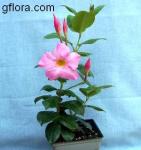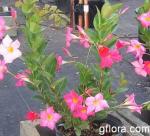|
|
DipladeniaFamily: Apocynaceae.
| Dipladenia sanderi rosea |
|
Dipladenia sanderi rosea |
 |
Syn. Mandevilla
Genus of about 120 species of mainly tuberous-rooted, woody-stemmed, twining climbers, with some perennials, from tropical woodland in Central and South America. Opposite, simple leaves are borne on stems containing a milky latex. Dipladenia can be grown as a climber, reaching 10 ft. or more, or you can grow it as a bush. Large flowers appear in summer. The pink blossoms appear on the plant while it is still small, and the glossy leaves make it attractive all year round.
Vigorous evergreen twining vine with thick, dark, 4" long leaves and whorled trumpet-like 3-5" flowers in various colors. Landscape use only in frost-free zones. Great trellised in containers or in hanging baskets. Mandevilla and Dipladenia are absolutely confused botanically and taxonomically. From the horticultural point of view, they may be treated the same.
Contact with sap may irritate skin. All parts may cause mild stomach upset if ingested. |
 |
| Growing conditions |
Watering and misting |
Propagation |
| Warm - minimum 55F in winter. Bright light or semishade - not direct sun. |
Water regularly from spring to autumn. Water sparingly in winter. Mist regularly, especially when in bud or flower. |
Take softwood stem cuttings in late spring or semi-ripe cuttings with bottom heat in summer. Sow seed at 64-73 F(18-23 C) in spring. |
User-submitted additions and corrections:
eric finkbeiner
U.S
17th Mar 2009
|
This plant is prone to aphid! Monitor your plant as the spring season progresses. They love the tender new growth shoots. The warmer climate is very conducive for the plant. It loves outdoor conditions in Zone 9 an 10 USDA. Grow in partial sun to encourage blooms. A member of the Oleander family (Nerium) |
|
These materials are freely provided for instructional and educational purposes. Any duplication or publication of text or images herein for commercial gain without explicit written permission of the owner or photographer constitutes breach of trust and violation of copyright.
Copyright © Galka Okhapkina 1998-2025


